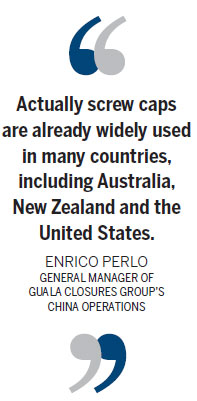Producer says screw caps more convenient and effective than corks
The use of screw caps in the wine industry has in recent years gained a wider acceptance throughout the world. From reds to whites to sparkling wines, companies are slowly turning away from putting a cork in.
But in China, where people are quickly gaining a deeper appreciation for wine, most still associate a cork with value. Presenting a bottle of wine with a screw cap could be perceived as cheap and inelegant.
|
 Enrico Perlo, general manager of Guala Closures Group's China operations, believes more Chinese wine producers will use screw caps instead of corks. [Photo/China Daily] |
All that is about to change, says Enrico Perlo, general manager of Guala Closures Group's China operations.
The company, which claims to be the world's largest producer of wine bottle screw caps, is banking on an influx of wine importers employing the practical, inexpensive caps.
"Some Chinese importers have already brought in screw-capped bottles of wine. For some Chinese consumers who generally don't know how to use a corkscrew, this makes screw caps less inimical and more convenient," Perlo says.
"Actually screw caps are already widely used in many countries, including Australia, New Zealand and the United States."
Perlo says screw caps are a sensible option in China because the wine culture is still young.
|
 |
With an influx of imported wine from countries such as Australia, he adds, Chinese consumers will become more familiar with the convenience of screw caps.
A recent industry forecast that backs Perlo says that nearly 35-40 percent of wine bottles will use screw caps in 2015.
Last year, Guala Closures Group, based in Italy, sold more than 1.2 billion screw caps, an increase of 50 percent over the previous year. Globally, 3.5 billion wine bottles were sold with screw caps.
Perlo says more winemakers are shifting to screw caps because the traditional cork, which is made of bark from the cork oak tree that takes 12 years to grow, is not keeping pace with the world's burgeoning wine industry.
One of the cork's drawbacks is that it doesn't perfectly seal the bottle opening and protect the wine.
A study for the American Society for Enology and Viticulture showed that 45 percent of all corks leaked unwanted gas into the wine.
"A wine (bottle) closed with a screw cap was definitely in better shape than the one closed with cork," Perlo says. "It was fresher with more of its fruit. Screw caps will be the final solution to wine producers."
Grace Vineyard, a wine producer in North China's Shanxi province, started using screw caps for some of its vintage in 2011 and plans to switch closures this year for its entry-level and premium-level wines.
Found in many five-star hotels and restaurants in Beijing and Shanghai, the Grace Vineyard chardonnay ranks among the best of Chinese wines.
